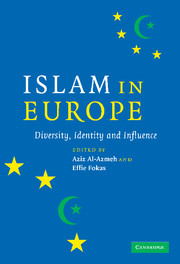Book contents
- Frontmatter
- Contents
- List of figures
- List of contributors
- List of abbreviations
- Preface
- 1 Introduction
- 2 Christians and Muslims: memory, amity and enmities
- 3 The question of Euro-Islam: restriction or opportunity?
- 4 Muslim identities in Europe: the snare of exceptionalism
- 5 From exile to diaspora: the development of transnational Islam in Europe
- 6 Bosnian Islam as ‘European Islam’: limits and shifts of a concept
- 7 Islam in the European Commission's system of regulation of religion
- 8 Development, discrimination and reverse discrimination: effects of EU integration and regional change on the Muslims of Southeast Europe
- 9 Breaching the infernal cycle? Turkey, the European Union and religion
- 10 Afterword
- Index
- References
3 - The question of Euro-Islam: restriction or opportunity?
Published online by Cambridge University Press: 05 June 2012
- Frontmatter
- Contents
- List of figures
- List of contributors
- List of abbreviations
- Preface
- 1 Introduction
- 2 Christians and Muslims: memory, amity and enmities
- 3 The question of Euro-Islam: restriction or opportunity?
- 4 Muslim identities in Europe: the snare of exceptionalism
- 5 From exile to diaspora: the development of transnational Islam in Europe
- 6 Bosnian Islam as ‘European Islam’: limits and shifts of a concept
- 7 Islam in the European Commission's system of regulation of religion
- 8 Development, discrimination and reverse discrimination: effects of EU integration and regional change on the Muslims of Southeast Europe
- 9 Breaching the infernal cycle? Turkey, the European Union and religion
- 10 Afterword
- Index
- References
Summary
In 2002 a group of senior journalists on the Danish daily newspaper Politiken published a collection of essays under the title ‘Islam in Denmark: reflections on a third way’. In their foreword they described the two positions between which they were positing a third way.
In one trench are the xenophobes who say ‘no thank you to everything’ regarding Muslims. They oppose the multicultural society, even though it is already reality. They are against further immigration, even though that is a condition for the continuing financing of the welfare state. They are sceptical about the immigrants' religion, customs, dress, etc., even though these are things which belong to the private sphere. The xenophobes prevail in large sections of the political parties and were especially visible in the general election campaign last autumn.
In the other trench are the so-called progressives who say ‘yes please’ to everything as regards Islamic culture. They see Muslims as inherently an enrichment of Danish culture. Any attempt to take a critical stand towards fundamentalist and reactionary tendencies in Muslim culture is automatically labelled racism and xenophobia.
Both stances are deeply problematical.
The following year another collections of essays appeared, this time edited by a group of young Danish Muslims of immigrant heritage, interestingly including an introduction by yet another Politiken journalist, Anders Jerichow.
- Type
- Chapter
- Information
- Islam in EuropeDiversity, Identity and Influence, pp. 34 - 48Publisher: Cambridge University PressPrint publication year: 2007
References
- 6
- Cited by



